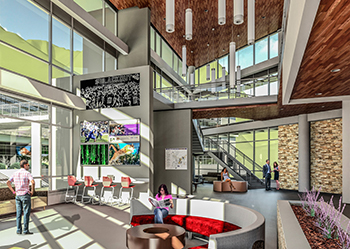 CULLOWHEE, N.C. — Western Carolina University (WCU) is planning for a new 45,000-square-foot community wellness and health building at its 344-acre Millennial Campus in Cullowhee.
CULLOWHEE, N.C. — Western Carolina University (WCU) is planning for a new 45,000-square-foot community wellness and health building at its 344-acre Millennial Campus in Cullowhee.
KSQ/Peterson (a regional office of KSQ Architects) is serving as the lead design firm for the new facility in partnership with Brackett Flagship Properties and Tyler 2 Construction. All three companies are based in Charlotte, N.C. The project is currently in the schematic design phase and is scheduled for completion in January 2017.
The new building is part of the university’s Millennial Initiative, which provides space for WCU faculty and students to work together with private firms, government agencies and non-profits on applied research and practices that benefit the entire region. “WCU is in a position to enter into public-private partnerships to enhance regional economic development beyond the university’s traditional educational mission,” said KSQ/Peterson Principal-in-Charge Doug Burns, AIA. “This promotes exciting new educational opportunities for students and faculty, and this new building is the designated space for those collaborations, learning opportunities and partnerships.”
In addition to being a medical office building, the space will offer a health retail component, flexible research space, and house clinics and services linked to WCU programs that offer collaborations between health care partners in the region and WCU faculty and students. As a Community Engaged University, WCU plans to enhance economic development in the region and create a community-oriented health workforce.
The new building was designed to visually complement the nearby Health and Human Science building — the first building on the campus — as well as vertically connect the two buildings together as a passageway, according to Burns. “We rebranded the entrance and created a new identity,” he added. “When people arrive at WCU’s Millennial Campus, there’s a road that has a leisurely wind to it and showcases the buildings tucked into a lush, Carolina setting.”
Inside, the building features collaborative spaces throughout with plug-and-play technology that offers information. There are also flexible and clinical spaces incorporated into the design as well as kiosk and bistro food-service areas that will provide food for up to 3,000 people.
“Connectivity, sustainable practices, flexible furniture and extensive use of natural light are important features for millennials,” said KSQ/Peterson Associate and Senior Project Manager David Meech, AIA. “The challenge of this design was to keep millennials in mind, but also design for the health care and regional business professionals that will occupy this space.”
Meech added that the site has been the biggest challenge on the project. “Besides the topography and need for horizontal connectivity, it’s important for the new facility to be part of a contextual design that enhances the existing four-story, LEED Gold Health and Human Science building and future buildings on the site,” he said. “We also designed to assure compliance to the Millennium Campus Mission and WCU’s Master Plan for the campus. The programming and planning considered WCU’s goal of being a regionally engaged university and a national model — going beyond a typical educational or medical space and incorporating the needs of different end-users into the design.”

